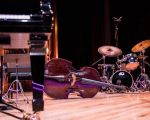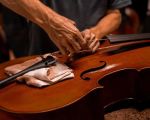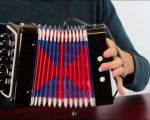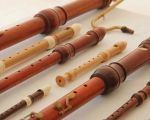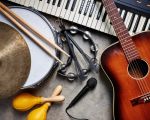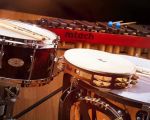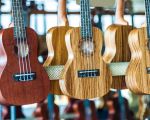How to Find Local Stores Selling Music Accessories
When you're looking to expand your musical gear collection, finding local stores that sell music accessories is essential. Whether you're a beginner or an experienced musician, having access to the right accessories can make all the difference in your practice and performance. But how do you locate stores in your area that specialize in music equipment and accessories? In this article, we'll guide you through the best ways to find local stores selling music accessories and provide tips on what to look for when choosing the right store for your musical needs.
1. Start with Local Music Stores
One of the most straightforward ways to find music accessories is by visiting local music stores. These stores typically carry a wide variety of music accessories, including strings, drumsticks, pedals, and other essential gear. You can start by checking online directories or Google Maps for music stores near you.
Local music stores are a great option because they allow you to physically test out products and ask for expert advice. Many stores also offer services like instrument repairs and lessons, making them a one-stop shop for all your musical needs. Some well-known music store chains like Guitar Center or Sam Ash have multiple locations across the country, and they offer a broad range of accessories both in-store and online.
2. Search Online Retailers and Marketplaces
If you're not able to find a suitable local music store or want to compare prices, online retailers and marketplaces can also be a great resource for music accessories. Websites like Amazon, Sweetwater, and Musician's Friend offer a vast selection of accessories, often with customer reviews that can help guide your decision-making.
While shopping online may not give you the chance to physically handle the products, it does provide the benefit of convenience and often competitive pricing. If you’re looking for a specific accessory or brand, online marketplaces such as eBay or Reverb can also be valuable resources for finding rare or second-hand items.
3. Visit Your Local Arts or Culture Centers
Many cities and towns have arts or culture centers that offer musical instrument classes or community events. These places often have connections with local suppliers and music stores, and some may even sell music accessories on-site. If you’re involved in a local music scene or participate in music lessons, ask around to see if any nearby cultural centers or art schools sell accessories or know where you can find them.
Local festivals and events can also offer an opportunity to discover small, independent music accessory vendors. These vendors may sell unique or handcrafted accessories like guitar straps, hand-made drumsticks, or vintage sheet music that you won’t find in larger chain stores.
4. Ask Fellow Musicians for Recommendations
Networking with fellow musicians can be one of the most effective ways to discover the best local stores for music accessories. Musicians, whether they are part of a band, taking private lessons, or playing in orchestras, often have recommendations for where to buy accessories locally. They might know about hidden gems in your area that you wouldn’t find through a quick internet search.
Online forums, social media groups, and local Facebook community groups are great places to ask for recommendations from people who live in your area. If you play a specific instrument, you might also want to check out specialized forums or instrument-specific communities where musicians frequently share their favorite places to buy accessories.
5. Check Out Second-Hand Stores or Pawn Shops
If you're on a budget or simply looking for unique or vintage accessories, second-hand stores and pawn shops can be a goldmine. While these stores may not have the latest high-end gear, they often carry used accessories that are still in great condition. You can sometimes find excellent deals on things like guitar pedals, drum accessories, or even rare sheet music.
Make sure to inspect the items carefully, especially if they’re used, and ask if the store offers any return policy or guarantees on the accessories you purchase. While second-hand items may not come with the same warranties as new products, they can still provide great value for musicians who are looking to try out new things or save money.
6. Consider Online Communities and Classifieds
If you're looking for a particular music accessory and can't find it in local stores, online classifieds like Craigslist or Facebook Marketplace can be a useful tool. Many musicians sell their used accessories on these platforms, and you might find just what you're looking for at a lower price.
One benefit of buying through these platforms is that you can sometimes meet with the seller in person to inspect the item before purchasing, which gives you a better idea of its condition. Be sure to exercise caution and verify the authenticity of the products before making any transactions.
7. Visit Local Music Events or Concerts
Local music events, such as concerts, festivals, or band performances, often feature booths or vendor tables selling music accessories. These events can be a fantastic opportunity to not only discover new accessories but also to meet other musicians and get recommendations for where to find the best products. If there’s a music event in your area, it might be worth attending just to explore what’s available for sale on-site.
Some music venues also partner with local stores or offer exclusive discounts on accessories, so be sure to check the event details for any special promotions or sales.
8. Explore Specialty Shops and Boutique Stores
In addition to large music chains, smaller specialty shops and boutique stores can offer high-quality, personalized music accessories that are unique and tailored to your needs. These stores often provide a curated selection of products and can be more knowledgeable about specific accessories suited to your instrument or style of music.
For example, a boutique store that focuses on classical music might offer premium violin strings, while a shop specializing in jazz might have the best trumpet mutes. These specialty stores are great for musicians who are looking for something specific and appreciate expert advice from knowledgeable staff.
If you’re in search of a specific accessory or looking for expert guidance on the right gear for your needs, these smaller, specialized shops can be the best option to ensure you get high-quality products and personalized service.
Finding the right music accessories for your needs can be a bit of a hunt, but with these strategies, you’re sure to find the perfect gear. Whether you're shopping at a local store, asking fellow musicians for advice, or exploring online platforms, there are plenty of options for finding music accessories that will help you take your musical skills to the next level.
SEO Title: How to Find Local Stores Selling Music Accessories – A Complete Guide SEO Keywords: music accessories, local music stores, find music accessories near me, where to buy music accessories, best stores for music accessories SEO Description: Looking for music accessories? Discover the best ways to find local stores selling music accessories, including expert recommendations, online options, and second-hand finds.

